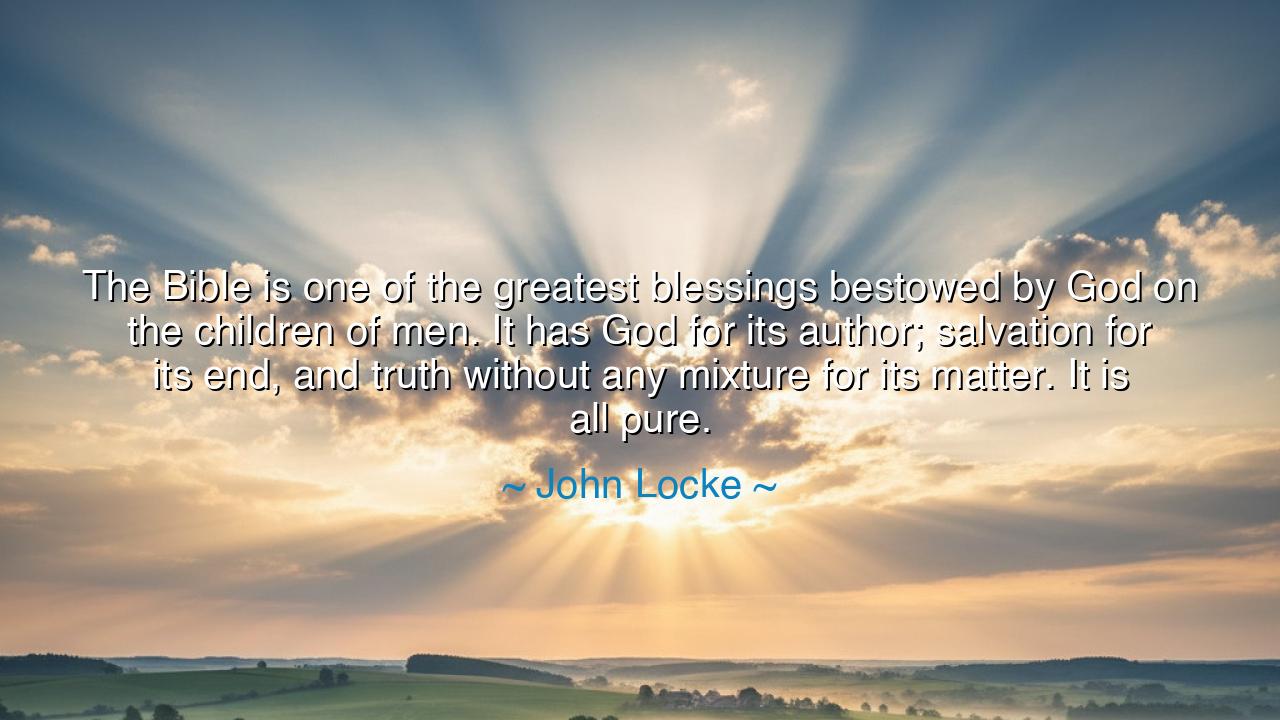
The Bible is one of the greatest blessings bestowed by God on the
The Bible is one of the greatest blessings bestowed by God on the children of men. It has God for its author; salvation for its end, and truth without any mixture for its matter. It is all pure.






The words “The Bible is one of the greatest blessings bestowed by God on the children of men. It has God for its author; salvation for its end, and truth without any mixture for its matter. It is all pure” were spoken by John Locke, the great English philosopher of the seventeenth century — a man whose rational mind and moral vision helped shape the foundations of liberty, reason, and faith in the modern world. Yet beneath his logical clarity burned a profound reverence for the divine. In this quote, Locke set aside the language of politics and philosophy to speak from the soul — to declare that the Holy Scriptures are not merely a book, but a living gift from God, a vessel of untainted truth and eternal mercy.
When Locke calls the Bible one of the “greatest blessings bestowed by God,” he places it among the most sacred treasures of humanity — not gold, not power, not invention, but revelation. For to him, knowledge of truth begins not in man’s intellect, but in God’s word. The Scriptures, he believed, were not the invention of human minds seeking to explain the divine, but the divine reaching down to reveal itself to human hearts. Thus, when he says that the Bible has “God for its author,” he affirms that behind every line and parable, every commandment and promise, there beats the mind and heart of the Eternal. Human hands wrote it, but the breath that guided them was not of this world.
Locke lived in a time of turmoil — a century shaken by civil war, sectarian division, and persecution done in God’s name. He saw how men twisted religion into a weapon and turned faith into a battlefield. In that darkness, he looked to the Scriptures not as a tool for domination, but as a mirror of divine order — a law above the laws of kings, a truth above human deceit. The Bible, for Locke, was the great equalizer: it revealed that salvation was offered not to rulers or scholars alone, but to all children of men, for its end is salvation — the redemption of the soul and the restoration of mankind to divine harmony.
To understand the purity Locke saw in the Bible, one might think of William Tyndale, who a century earlier translated the Scriptures into English so that even a ploughboy might read the Word of God. For that act of faith, Tyndale was strangled and burned at the stake. Yet before he died, he prayed, “Lord, open the King of England’s eyes.” His courage ensured that generations would hear and know the truth Locke later called “pure, without mixture.” The sacrifice of Tyndale and others like him proved that the Bible was not merely a text to be studied — it was a fire that could not be extinguished, the eternal voice of God speaking through mortal tongues.
When Locke says that the Bible’s matter is “truth without any mixture,” he contrasts divine truth with human opinion. Human knowledge changes with the ages; empires rise and fall, and philosophies fade like smoke. But divine truth endures, unbroken and undiminished. It is not alloyed with deceit or corruption. It speaks to the conscience, convicts the heart, and offers hope where reason alone cannot reach. The purity Locke describes is not merely moral — it is metaphysical: the Word of God is reality itself, unfiltered by illusion, the lamp that reveals both God and man.
In the style of the ancients, we may say that the Scriptures are a ladder between heaven and earth, upon which the faithful ascend by faith, and through which divine wisdom descends to guide their steps. To read them rightly is to hear God whisper through the ages — in the thunder of Sinai, in the still voice that spoke to Elijah, in the compassion of Christ who taught forgiveness and love. For Locke, to hold the Bible in one’s hands was to hold eternity in one’s grasp — to possess something more enduring than kingdoms, more powerful than armies, more radiant than the sun.
The lesson Locke leaves is timeless: treasure the Word of God as the foundation of wisdom and liberty. Let it not gather dust upon a shelf, but let it be the compass of your heart. Read it not as a mere history or creed, but as a living conversation between the Creator and His creation. The truths it carries do not fade with time, for they are written not only on parchment but in the fabric of the soul itself.
Practical actions: Begin each day with a passage from Scripture. Reflect not only on its words but on the spirit behind them. Let its lessons shape your deeds, its comfort steady your heart, and its justice guide your steps. Remember always Locke’s conviction: that the Bible is pure, and that within its pages lies the eternal dialogue between God and humanity — the greatest of all blessings, bestowed for the salvation of every soul willing to listen.






AAdministratorAdministrator
Welcome, honored guests. Please leave a comment, we will respond soon